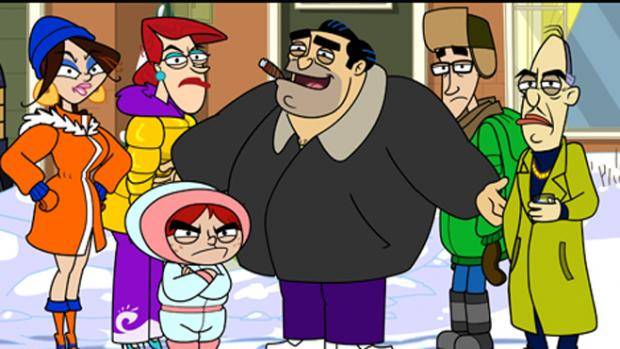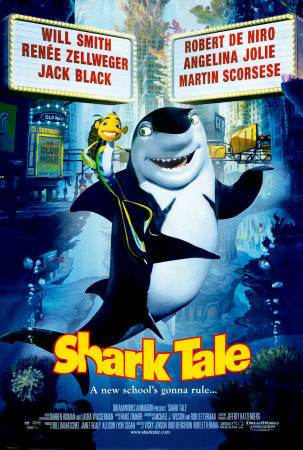Stereotypes? Don’t “Fugget About It”
Give me a break. The latest attempt to bottle and sell the dying gasp of the gangster figure in American culture now comes to us from north of the border, and “Fugget About It” is not just the name of this Canadian cartoon series, it also refers to what you can do with it, because this silly show will be more easily forgotten than remembered.
There is nothing new in this animated attempt to parody the Italian American gangster that at the same time lampoons the eccentricities of U.S. and Canadian cultures. Unlike “The Sopranos,” one of the main victims in its parodic sites, the series provides little substance for serious interpretative attention.
Here are all the same jokes, some taken to ridiculous absurdities, others nothing more than dead horses overbeaten by unimaginative writing. The only discussion warranted by this latest incarnation of the Italian American gangster is just how these stereotypes can be taken seriously by anyone, especially those suffering from what I have termed, “irony deficiency.” Irony deficiency comes from ignorance, fear, and or the inability to detach oneself from what it is that can be ironized. Irony deficiency leads to the disease of literalism evidenced by the inability to see any serious use of irony at work or play.
To understand how and why stereotypes can affect viewers’ conceptions of reality, we need to know where stereotypes come from and why are they used. Stereotypes are meant to project possibilities, not to reflect realities. Stereotypes in storytelling have always been used to entertain adults and to instruct youth about proper and improper behavior. Indeed, as Freud discovered, the early myths were stories that helped to explain human behavior. As we have created better understanding of the working of the human mind, storytelling became less dependent on the use of types, that is, as writers began to delve into ways of representing the mind, the use of flat figures became more and more relegated to popular entertainment.
Stereotypes eliminate complexities and allow you to rest assured in your expectations of what will happen so that you are lulled and not jolted by stories. Whenever a stereotype is destroyed, it is usually through a sophisticated experience that leads us deeper in our understanding of what is human.
There is a difference between storytelling and life telling, and that difference is made evident through a proper education. Stereotypes mask the reality they attempt to portray or represent. In order to be drawn into a story we need to pretend that this is something that might really happen. If this doesn’t happen, then the artist has lost us and we are always conscious that this is a story; these thoughts lead us into other thoughts, like what we’re going to do after the movie or other things that occupy our daily thoughts, taking us out of the dream world of story and back to the real world we were trying to escaped in the first place.
While the response of any educated mind to “Fugget About It” would be to wave the whole thing off as a joke, for those who don’t know the difference, there is nothing funny about this subtle reinforcement of stereotypes. Such a naïve approach to “humor,” fueled by what I have called “irony deficiency” — or the inability to perceive when irony is intended — leads to people feeling offended by such stereotypes. There’s a problem here that’s rather complex.
Film and video artists believe they are using these figures to say something about American society, and the best ones do; however, but really, those who do not understand these stereotypes cross the line between reinforcing ignorance and changing perceptions. I attribute this to the late development of a recognizable Italian American intelligentsia and the absence of exposure to alternative experiences of Italians in American history. Until Italian Americans are educated to their own histories, know their own stories, and tell them to others, they will never have the power to challenge the negative images that are presented. Until those histories become part of education in the United States, the stereotypes will continue to be interpreted as reality. Without cultural developments such as the Harlem Renaissance, the American Civil Rights movement would have never developed to change perceptions about African Americans. Where is the Italian American Renaissance?
The only way to deal with the persistence of the stereotypes that distort perceptions of Italian Americans is to become more public with culture, to exchange ignorance for knowledge and prejudice with trust. If we achieve this in the classroom we can turn students into teachers, who will make the streets a better place. We must inundate the classrooms, the museums, the libraries, theaters, and media with versions and visions of Italian American culture that place those stereotypes in the shadow of the great lights we have created for the world to see.
The key to disarming a stereotype and relegating it to its simple storytelling function lies in the ability of the beholder, the audience, to acknowledge the greater complexity of life that the stereotypes obscure. And this ability comes only through experience. When your experience is limited to two-dimensional stories, your life-view becomes filtered by stereotypes. Remember what you see is not about accurately representing reality, but rather is a way of telling you a story. You need to ask yourself: What story am I being told? What am I asked to believe? How can I interpret this so that I can test it against reality?
The storyteller has a goal that is quite different from the story receiver. The storyteller must get you to believe or see something in a certain way, but your goal should be to see it in any number of ways so that you can disarm the power of the storyteller and use that power as a way to improve your life. When we have learned this, and moved to insure that culture and its institutions are sensitive to our Italian American identities and heritage, then we will begin to concentrate on the light that illuminates and not the shadows of stereotypes that distort our vision of the world.
* Fred Gardaphe is Distinguished Professor of English and Italian American Studies at Queens College/CUNY and the John D. Calandra Italian American Institute. He has published several books, incuding From Wiseguys to Wise Men: Masculinities and the Italian American Gangster (Routledge, 2006).






































i-Italy
Facebook
Google+
This work may not be reproduced, in whole or in part, without prior written permission.
Questo lavoro non può essere riprodotto, in tutto o in parte, senza permesso scritto.